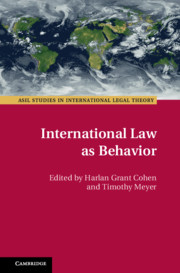Book contents
- International Law As Behavior
- ASIL Studies in International Legal Theory
- International Law As Behavior
- Copyright page
- Dedication
- Contents
- Tables
- Contributors
- Acknowledgments
- 1 International Law As Behavior
- 2 Deadlines As Behavior in Diplomacy and International Law
- 3 Cooperating without Sanctions
- 4 Egocentric Bias in Perceptions of Customary International Law
- 5 Explaining the Practical Purchase of Soft Law
- 6 Toward an Anthropology of International Law
- 7 Transnational Collaborations in Transitional Justice
- 8 Advancing Neuroscience in International Law
- 9 The Missing Persons of International Law Scholarship
- 10 The Wrong Way to Weigh Rights
- Index
9 - The Missing Persons of International Law Scholarship
A Roadmap for Future Research
Published online by Cambridge University Press: 15 March 2021
- International Law As Behavior
- ASIL Studies in International Legal Theory
- International Law As Behavior
- Copyright page
- Dedication
- Contents
- Tables
- Contributors
- Acknowledgments
- 1 International Law As Behavior
- 2 Deadlines As Behavior in Diplomacy and International Law
- 3 Cooperating without Sanctions
- 4 Egocentric Bias in Perceptions of Customary International Law
- 5 Explaining the Practical Purchase of Soft Law
- 6 Toward an Anthropology of International Law
- 7 Transnational Collaborations in Transitional Justice
- 8 Advancing Neuroscience in International Law
- 9 The Missing Persons of International Law Scholarship
- 10 The Wrong Way to Weigh Rights
- Index
Summary
Interdisciplinary research of international law has been on the rise in recent decades and scholars have adopted widely varying disciplines, methodologies, and theoretical frameworks to investigate international legal behavior. However, it is this chapter’s contention that a lion’s share of the literature on international legal behavior has understated the role of individual people in international law. Although international law is made, implemented, changed, or broken by people, this ontological insight has not found its way into influential paradigmatic views of international law and consequently has not been adequately embedded in methodologies, theoretical accounts, and research agendas. This chapter offers an illustrative review of relevant scholarship, critiques the scholarship’s statism and outlines its implications. It uses the United States case of the Torture Memos as a means to demonstrate the pitfalls of the literature’s statism and the potential benefits of steering away from it. The chapter therefore argues that future interdisciplinary work of international law would benefit from ridding itself of the dominance of paradigmatic statism and instead recognizing the central role of individuals in the everyday practice of international law.
Keywords
- Type
- Chapter
- Information
- International Law as Behavior , pp. 230 - 264Publisher: Cambridge University PressPrint publication year: 2021

